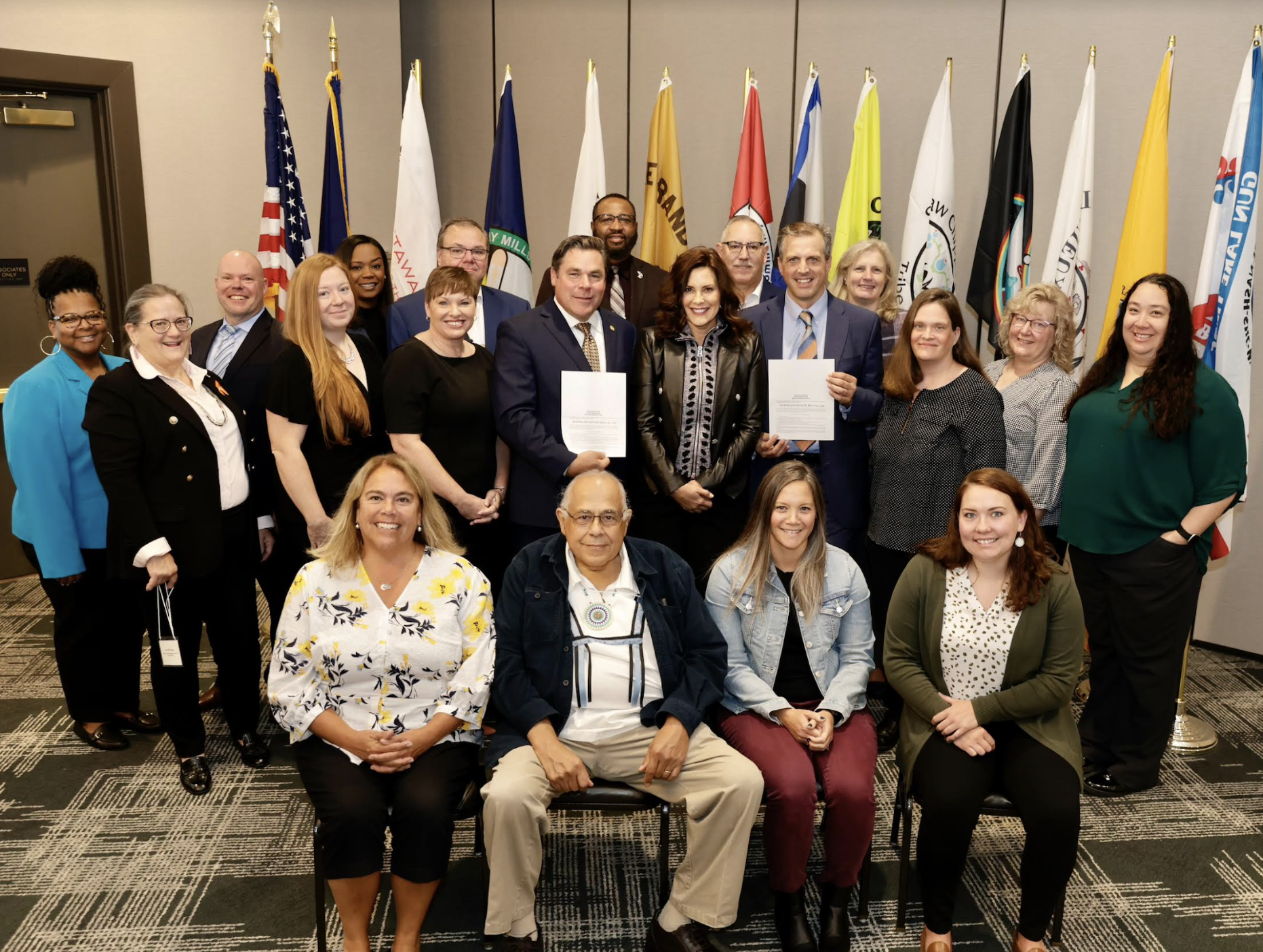
- Details
- By Levi Rickert
LANSING, Mich. — Several Michigan tribal leaders and tribal staff members were on hand Thursday morning in Lansing, Michigan, for a ceremonial signing of Senate Bills 137 and 138 by Democratic Governor Gretchen Whitmer. The bills amend the Guardianship Assistance Act to provide for guardianship assistance program (GAP) eligibility for guardianship arrangements made by tribal and out-of-state courts.
The guardianship assistance program provides financial support to guardians of eligible children, with the goal of ensuring a stable, permanent home for children who may otherwise remain in foster care until they are 18 years of age.
The actual bills were signed on July 11, 2023, but Whitmer wanted to showcase tribal collaboration and bipartisanship in the Senate that brought the bills to fruition.
Previously, under the GAP, guardians were only eligible for payments if the child’s removal proceedings started in state courts. The bills amend the state’s GAP so that legal guardians designated by out-of-state or tribal court orders would be eligible for financial assistance. Finally, the bills prescribe certain case service plan requirements and guardianship arrangements for siblings.
“Not only did these bills improve the lives of tribal citizens, they also support tribal self- governance and sovereignty," Gov. Whitmer said. "This is a priority that unites us from the Upper Peninsula to Southeastern Michigan."
Michigan State Senator Jeff Irwin (D), a tribal citizen of the Sault Ste. Marie Tribe of Chippewa Indians, and State Senator John Damoose (R) introduced the legislation.
"It's just fundamentally important that we respect the rights of all people equally here in the state of Michigan that obviously includes tribal communities," Irwin said to Native News Online. "So when I found out that there were families who were not getting the same support that they would have if their guardianship had their cases been moving through a state court, specifically because their guardianship was with their tribal court, that's just wrong, and we needed to correct that wrong,”
Irwin said he became aware of the situation after he was approached by tribal leaders who said “this is a wrong that needs to be corrected.”
“I really appreciate the tribal leaders who brought this up to legislators and said, Look, this is wrong that needs to be righted. And I'm really appreciative of my colleague, Senator Damoose, who was willing to work with me in a bipartisan way to get this done. And the governor and her team that helped shepherd us through relatively quickly and get it signed,” Irwin said.
Bay Mills Indian Community President Whitney Gravelle told Native News Online that the legislation was initiated from a case that was in her tribe’s court.
“What we were seeing is after years of having children in a safe guardianship and being able to work towards repairing relationships with their family and with their parents, that it was a guardianship that was still going to be able to provide them the most protection,” Granville said.
“As we were discussing how we would be able to move this case towards guardianship out of foster care, we realized that the way the system was currently structured, was actually not beneficial in the sense that our tribal families would not receive any type of guardianship assistance in order to be able to take care of their families. So as we were talking about it, we realized the only thing to do was to actually change the law and change the legislation.”
Damoose also sees the bills as correcting a wrong.
“Without this assistance, many cannot afford to step into the guardianship role, causing children to be placed in foster care instead," Damoose said. "These bills seek to right a wrong and help kids stay connected to their family and communities. The simple goal is to achieve a solution that is in the best interest of the children.”
More Stories Like This
NCAI Passes Two Emergency Resolutions on Immigration Enforcement ActivitiesChickasaw Lighthorse Police Officer named Indian Country Law Enforcement Officer of the Year
Indian Gaming Association Rallies Broad Coalition Against Sports Event Contracts It Calls Illegal Threat to Tribal Sovereignty
Navajo Resources and Development Committee Issues Notice on Livestock Inspection Requirements
American Prairie, Tribal Coalition Files Protest Over Rescinded Grazing Rights
Help us defend tribal sovereignty.
At Native News Online, our mission is rooted in telling the stories that strengthen sovereignty and uplift Indigenous voices — not just at year’s end, but every single day.
Because of your generosity last year, we were able to keep our reporters on the ground in tribal communities, at national gatherings and in the halls of Congress — covering the issues that matter most to Indian Country: sovereignty, culture, education, health and economic opportunity.
That support sustained us through a tough year in 2025. Now, as we look to the year ahead, we need your help right now to ensure warrior journalism remains strong — reporting that defends tribal sovereignty, amplifies Native truth, and holds power accountable.
 The stakes couldn't be higher. Your support keeps Native voices heard, Native stories told and Native sovereignty defended.
The stakes couldn't be higher. Your support keeps Native voices heard, Native stories told and Native sovereignty defended.
Stand with Warrior Journalism today.
Levi Rickert (Potawatomi), Editor & Publisher

